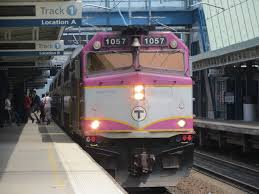|
6/17/2018 1 Comment The Commuter Rail and Your Net Worth. How Much Value Does a Commuter Train Stop Add?
In the Northeast, access to the commuter rail into major metropolitan areas is a way of life. Decisions about where to live can be made on access to getting into Boston, New York, Philly, and the DC metro areas.
In Massachusetts, the MBTA is almost an institution for commuters, and is as common as any highway. Hundreds of thousands of people depend on it to avoid the expense, time, and fatigue of driving into Boston each day. Simply drive to the nearest train station, park for the day, and let the train do the driving. You can work, sleep, or socialize for 30-45 minutes on your way to work. As most commuters will also tell you, it’s a lot less expensive to use the rail than to drive. So much so that there have been many articles written that suggest home values in cities that have stops on the commuter rail command higher values than towns without a stop due to the demand for the rail. One study from 2013, completed by the American Public Transportation Association (APTA) and the National Association of Realtors® (NAR) reveals that during the last recession, residential property values performed 42 (41.6) percent better on average if they were located near public transportation with high-frequency service. Many others seem to mirror this same conclusion. But is this conclusion a reality or just anecdotal confirmation of our gut instincts? What are the real economics of the rail vs. car travel, and does having a commuter rail stop in your town increase the value of your home? Let’s first do the math, and then discuss a study that examined this very question when the MBTA re-opened a station in Scituate MA in 2007 after a 40 year absence. The Math: Train Vs. Driving To compare real cost savings and to account for all factors (gas, depreciation, insurance, parking, commuter rail fees etc), I found a useful online calculator designed for this purpose. See link at end of article. Using a base assumption of $100 per month to park in Boston (very light, I know, but let’s assume you know a friend of a friend who found you a spot), and assuming you pay roughly $25 per day for round trip and parking on the rail (let’s use Attleboro as the assumption), which would be a 45 mile commute each way. $2.50 per gallon average, and with a few other assumptions in the calculator it shows that a typical commuter can save upwards of $150 to $300 per month depending on costs to park. Perhaps more. That’s between $1,600 and $3,200 per year - definitely not chump change. But are the economic savings, the reduced stress (unless you are always late for the train), and the other intangibles adding enough value to create higher demand for homes in towns that have a commuter rail? Scituate, MA Study: Commuter Rail and Home Values In my research I found a number of interesting studies, but one in particular released by Colby College in 2017 caught my attention. It examined the home values in Scituate, MA both before and after the MBTA Greenbush line was restarted in 2007 after a 40 year absence, and compared those values to homes in nearby Norwell and Hanover, which did not have a train stop added to the line. The results are surprising. Based on over 150 homes examined in Scituate that existed before and after the train stop was added, it found that those values showed no statistically significant increase to home values in Norwell or Hanover. This mirrors other studies that suggest that noise, traffic, and other factors seem to cancel out the economic benefits of a conveniently located station. Obviously, I’m condensing the information to make this a readable post. But the general conclusion could be this: Choose a home because you love the home, it works for your family, you like the neighborhood or school system, and because you can afford it. If it is in a town with a commuter rail station, then that is a bonus, but probably not the driving factor for a decision. (Pun intended). CLICK HERE AND SCROLL DOWN THE PAGE FOR A LINK TO COMMUTER RAIL CALCULATOR About Kelly Crowley Kelly Crowley is a Licensed Real Estate agent for Keller Williams Realty. Kelly has lifelong ties to the area and a keen understanding of the marketplace through her personal history and extensive knowledge of the varied communities she serves Kelly invests her passion for the area by serving her clients with the utmost integrity, honesty and expert guidance in their real estate endeavors. When you’re seeking an agent who will put your goals first, call on Kelly Crowley. [email protected] c. 734.274.0707
1 Comment
The vote is in, and a new high school is coming to Attleboro. If you are a homeowner, whether you voted for or against the debt exclusion this past spring (or perhaps didn’t vote at all), the only question that remains is this: Will the new high school really increase property values?
We’ve all heard the anecdotal arguments that good schools increase property values. There is ample evidence to support this conclusion. In a 2013 Realtor.com survey, one out of five of those surveyed said they would pay between six and ten percent more for a home – and one out of ten people surveyed stated that they’d go even higher, paying up to 20 percent more for a home with access to the right schools. (See Hopkington, Southboro, and Westboro). But does a new high school building have the same effect as a well funded school system? The good news is that Attleboro is in position to have both. The most recent U.S. News and World Report rankings for Massachusetts had Attleboro ranked 79th in the state, a strong ranking that compares well with other towns in the area. And study after study show that a good school system is almost always one of the top five reasons people choose where to live. Higher Taxes or Higher Property Values? Or Both? The new high school also means higher taxes, so will those new taxes we all have to pay actually result in a school building that increases home values more than the taxes paid? The data is somewhat muddled, but I did find two studies that analyzed and statistically validated that in fact the new buildings on their own have two measurable effects: 1) an increase in student test scores and 2) an increase in home values for the communities it serves. In one 2011 study conducted at Yale, which measured the effects of major new construction in a historically poor area of Maryland, the study found that while the new construction initially lowered test scores due to the disruption during construction, after six years, the test scores and home values increased and were sustained increases in the entire area. In a second study conducted at Michigan State that analyzed Ohio’s capital subsidy program which distributed over ten billion dollars for school construction and renovations to 231 school districts between 1997 and 2011, a similar conclusion was made. The housing price result suggests that a $10,000 increase in prior year capital expenditures is associated with a 1.2% increase in housing prices relative to the average housing price in our sample, which is similar in size to the 10% increase found in Neilson and Zimmerman (2014) as a result of $70,000 per pupil increase in capital expenditures. In Attleboro terms, when coupled with the State funds, Attleboro now has a $260,000,000 capital commitment spread over approximately 7,000 students in the entire school system, equating to $37,000 per student. Translation: It’s not unreasonable to think our home values will be worth 3-5% more than they would have been simply due to the new high school. For a home worth $300,000, that would be $9,000-$15,000 in increased value with the expected increase in tax expenditure in 10 years approximately only $3,000. Obviously, time will tell and many other factors can have an impact, but if these peer-reviewed studies apply, it looks like we made a good investment. About Kelly Crowley Kelly Crowley is a Licensed Real Estate agent for Keller Williams Realty. Kelly has lifelong ties to the area and a keen understanding of the marketplace through her personal history and extensive knowledge of the varied communities she serves. Kelly invests her passion for the area by serving her clients with the utmost integrity, honesty and expert guidance in their real estate endeavors. When you’re seeking an agent who will put your goals first, call on Kelly Crowley. [email protected] c. 734.274.0707
If you own land and have been thinking about selling, you might think it's a pretty clear-cut proposition.
With land development, it is rarely that easy, and there are many details you will need to be aware of as you navigate selling your property. I’ve included a few examples of some obstacles I’ve encountered, and ways that you can prepare for them before you decide to sell.
These are just a few of the many examples of challenges that can pop up when you finally decide to sell your land. It is important to know your land, understand the town regulations and learn the value of your land. An acre in one area can be vastly different than an acre in another, even if they are in the same town. Before you list your land, give me a call and I’d be happy to give you an initial assessment of your land and work with you to get the right information as it pertains to town rules and regulations. About Kelly Crowley Kelly Crowley is a Licensed Real Estate agent for Keller Williams Realty. Kelly has lifelong ties to the area and a keen understanding of the marketplace through her personal history and extensive knowledge of the varied communities she serves. Kelly invests her passion for the area by serving her clients with the utmost integrity, honesty and expert guidance in their real estate endeavors. When you’re seeking an agent who will put your goals first, call on Kelly Crowley. [email protected] c. 734.274.0707 |
AuthorAbout Kelly Crowley : Kelly Crowley is a Licensed Real Estate agent for Keller Williams Realty. Kelly has lifelong ties to the area and a keen understanding of the marketplace through her personal history and extensive knowledge of the varied communities she serves. Archives
January 2021
Categories |



 RSS Feed
RSS Feed
